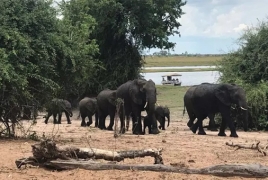African elephants develop new mechanisms for migrating to safety March 11, 2019 - 11:46 AMT PanARMENIAN.Net - The Chobe National Park in northern Botswana is a 11,700 sq km (4,517 sq mile) sanctuary for animals. Families of endangered African elephants wander freely through the park, which is bordered by Namibia in the north and Zimbabwe in the east. The animals visit watering holes, feed on the lush vegetation, and play with the youngest of their groups. African elephants in nearby countries such as Zimbabwe, Zambia, and Namibia are migrating to parks like Chobe, where strict anti-poaching policies allow them to thrive. Botswana is now home to roughly 130,000 elephants—a third of Africa’s entire elephant population. This is an increase of over 30,000 elephants in Botswana since 1995 against a backdrop of declining numbers across the continent. Researchers believe this migration is just one survival mechanism elephants have developed in response to poaching, conflict, urbanization, agriculture, and other pressures in Africa, Quartz says. researchers at the University of Twente in the Netherlands worked with Save the Elephants to conduct a study last September on African elephant migratory patterns. They found that some elephants in sub-Saharan Africa have started uncharacteristically travelling at night to avoid the threat of poaching that usually occurs during the day. Elephants also have developed sophisticated gestures, sounds, infrasound, and even chemical secretions to relay messages to one another for survival purposes. “Through various means, elephants can suggest that the group moves on, that they sense danger, or that they are in distress,” says Iain Douglas-Hamilton, founder of Save the Elephants, a UK charity headquartered in Nairobi that conducts research on elephant behavior and ecology. Researchers have also found that African elephants can differentiate between human languages in order to identify potential threats. For instance, elephants in Kenya’s Amboseli National Park, near the Tanzanian border in the south, have shown the ability to distinguish between the voices and scents of potentially threatening spear-carrying Maasai warriors with those of less threatening farming tribes. Azerbaijani authorities report that they have already resettled 3,000 people in the Nagorno-Karabakh town of Stepanakert. On June 10, Azerbaijani President of Azerbaijan Ilham Aliyev will leave for Turkey on a working visit. Azerbaijani President Ilham Aliyev arrived in Moscow on April 22 to hold talks with Russian counterpart Vladimir Putin. Authorities said a total of 192 Azerbaijani troops were killed and 511 were wounded during Azerbaijan’s offensive. Partner news |